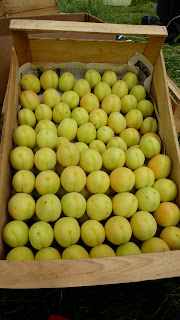Without a doubt, Armenian apricots are the sweetest, juiciest, tastiest apricots in the world. As it turns out, they decided to ripen just in time for my visit.
On one hand, I was delighted with my timing. I'd be able to eat as many apricots as my heart desired and they'd be straight from the field. Talk about eating local. On the other hand, I couldn't have come at a busier, more stressful time for the village of Surenavan.
On Tuesday morning I decided to call my dear friend Alla to schedule my visit. I had gotten myself all ready to spend the day catching up and seeing her family, but I quickly realized just how busy it was when Alla even said she was headed to the field to help and couldn't meet until that night. This was going to be a hectic week.
It didn't take long for me to change my plans though. At Heriknaz's pleading I threw on a pair of jeans despite the 90+ degree weather and headed down to try my hand at apricot picking. How hard could it be? Let me tell you, it's not easy.
Obviously the apricots ripen in the sun, so the higher in the tree you go the better the picking is. Balancing on tree limbs is one thing. Balancing while reaching for the best fruit is even tougher. You'll see above that Sourik* (left) and Gevorg (right) have their shirts tied at the waist and just drop the fruit down through the neck hole until the weight's too much and they have to unload. This, in addition to pesticides, children, is another reason why we wash our fruits and veggies before eating.
Here are my two little monkeys Samvel (left) and Hermine (right). They're Donara's two youngest (after baby Sara) and best buds.
The climbers unload their shirts into huge white bins that the stronger boys carry across the field to where the women are organizing the crates. Souren, Donara's oldest son, (above) was showing off his weight lifting skills by carrying it over his head. It's an impressive feat actually, I bet that crate easily weighs 30 lbs. He will dump out this bin on one of the nearby tarps.
The women sit next to the tarps with two 1.5' x 3' crates. When I arrived the first day Donara told me that the organizing was hard work and that I wouldn't be able to do it, but I was determined not to sit around the house like a bump on a log all week so I told her I'd study her methods and then try it out with her supervision.
You stand up the first layer of apricots with the bottom facing up. I added a little touch of style by lining up the seams which I think got me bonus points when she graded that first crate.

You follow up with a second layer, making sure to squeeze the little ones along the side so a lot of shifting doesn't take place while they're being transported by truck or plane to Moscow. Once the second layer is laid you've set up a nice little bed to put the biggest, ripest, roundest apricots on top on their sides. This looks great and keeps everything in place.
Look at that excellent organization! It's hard work, but you get to reward yourself with an apricot or two along the way so who can complain?
It takes about 20-25 minutes - depending on the selection nearest you on the tarp and the size of the apricots that day - to fill one crate. The first day, four of us did 70. The next day 60. Thursday, the team filled 150 crates. These three weeks will be the busiest this village sees all year. Everywhere you go people are running to their fields, tractors are motoring by, boys are packing up to spend the night in makeshift houses to guard their goods. It's quite a sight. It's a big deal though. Some families make enough from their harvest to do expansive home remodeling projects. Some are able to have their children's weddings. My family talks of buying a small apartment in Yerevan with this year's earnings. Beyond basic living expenses, a strong season opens opportunities for families to do what we might do with a hefty tax return.
My host brother, Gevorg, contracted with 'a rich man' from Hoktemberyan who will buy our apricots and sell them at a huge markup in Russia. He sent the workers to organize the crates to make sure he wasn't getting cheated. Apparently if he didn't do this the tendency for farm owners it to put poor quality produce at the bottom of the crates and the good stuff at the top. One day, the rich man and his posse showed up to check on the workers. There I sat, organizing right along beside his hired help. He came up and asked who I was and what I was doing. Donara and the ladies explained that I was the American family member who liked the work, did a good job, and wanted to help. He walked over, messed up my work (I was on the third layer of this particular crate) and agreed. I felt pretty proud of that.
The weather this time of year is excessively hot, but we all had to eat. Each day around 2 p.m. we would gather on a crate-made table for cheese, sour cream, bread, bologna, tomatoes, cucumbers, water and fruit soda. When Heriknaz (my host mother) heard I wouldn't touch the bologna she also sent some zucchini and green bean dishes that were fantastic.
Working in the field is good, honest labor. It's exhausting, but in a very different way from the work I do on a regular basis. I had time to chit-chat with Donara and the ladies. I had time to think about how happy Dominic and I would be owning a farm. I was able to actually produce a product and watch my work stack up before my eyes. It was a really rewarding experience.
*Sourik is 73 years old. He works harder in this field than just about anyone and inspires everyone to keep up despite the heat, lack of sleep and discomfort.








No comments:
Post a Comment